Three share Nobel medicine prize for new tools to kill parasites (Update)
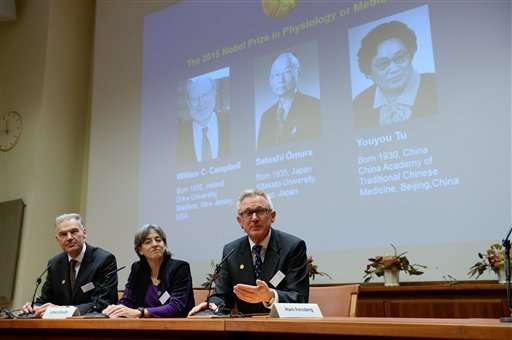
The Nobel prize in medicine went Monday to three scientists hailed as "heroes in the truest sense of the word" for saving millions of lives with the creation of the world's leading malaria-fighting drug and another that has nearly wiped out two devastating tropical diseases.
Tu Youyou—the first-ever Chinese medicine laureate—turned to ancient texts to produce artemesinin, a drug that is now the top treatment for malaria. Inspired by traditional Chinese medicine, Tu discovered that a compound from the wormwood plant was highly effective against the malaria parasite, while working on a project for the Chinese military during the Cultural Revolution.
She will share the 8 million Swedish kronor (about $960,000) award with Japanese microbiologist Satoshi Omura and William Campbell, an Irish-born U.S. scientist.
Omura and Campbell created the drug avermectin, whose derivatives have nearly rid the planet of river blindness and lymphatic filarisis, diseases caused by parasitic worms and spread by mosquitos and flies. They affect millions of people in Africa, Latin America and Asia, leaving sufferers blind or disfigured and often unable to work.
The Nobel committee said the winners, who are all in their 80s and made their breakthroughs in the 1970s and '80s, had given humankind powerful tools: "The consequences in terms of improved human health and reduced suffering are immeasurable," the committee said.
The Carter Center called the three laureates "heroes in the truest sense of the word, saving lives through medicine."
Campbell, 85, is a research fellow emeritus at Drew University in Madison, New Jersey. He told the AP he made his main discovery in 1975 while working at pharmaceutical company Merck.
"It was a great team effort," said Campbell, who now lives in North Andover, Massachusetts. He said the award came as a "huge surprise."
Omura, 80, is a professor emeritus at Kitasato University in Japan and is from the central prefecture of Yamanashi. He wondered whether he deserved the prize.
"I have learned so much from microorganisms and I have depended on them, so I would much rather give the prize to microorganisms," Omura told Japanese broadcaster NHK.
Working in the 1970s, Omura isolated new strains of Streptomyces bacteria and cultured them so that they could be analyzed for their impact against harmful microorganisms, the Nobel committee said.
Omura said the crucial strain was found in a soil sample from a golf course near Tokyo. He said he always carries around a plastic bag in his wallet so he can collect soil samples.
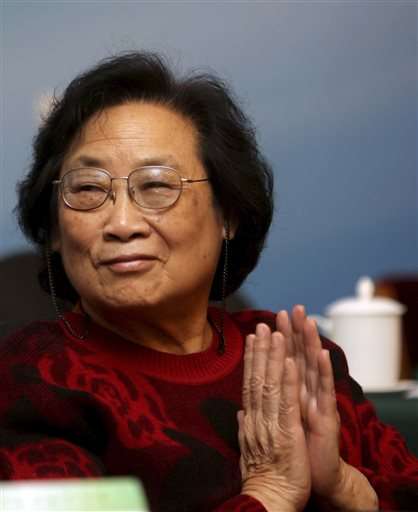
Campbell showed that one of those cultures was remarkably efficient against parasites in animals, the committee said. The bioactive agent was purified, named avermectin and modified to a compound that effectively killed parasitic larvae, leading to the creation of a new class of drugs.
Today, its derivative ivermectin is considered a highly effective preventive treatment against river blindness and lymphatic filariasis, the committee said.
"(Ivermectin) reduces the number of parasites in the blood so that when a mosquito bites someone, it cannot transmit the disease to someone else," said Dr. Peter Hotez, dean of the National School of Tropical Medicine at Baylor College of Medicine in Houston. He said mass distribution campaigns have given out ivermectin for free to 450 million people in efforts to eliminate both river blindness and lymphatic filariasis.
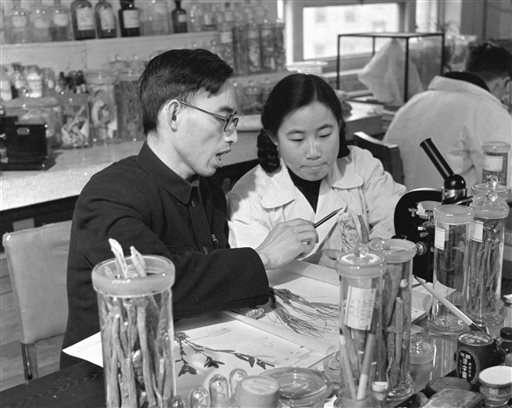
Hotez said that in parts of Africa, adult sufferers of river blindness are often led around with a stick by a young child. Until ivermectin came along, Hotez said there was no way to effectively prevent the disease.
Tu, 84, is a researcher at the China Academy of Chinese Medical Sciences.
As a junior researcher, she was recruited by Chairman Mao's government to work on a military project in 1969 to find malaria drugs.

She turned to herbal medicine to discover a new malarial agent in an extract from the sweet wormwood plant. The agent, artemisinin (pronounced ar-tuh-MIHS'-ihn-ihn), was highly effective against malaria, a disease that was on the rise in the 1960s, the committee said.
Malaria is a mosquito-borne disease that still kills around 500,000 people a year, mostly in Africa, despite efforts to control it.
Colin Sutherland, a reader in parasitology at London School of Hygiene and Tropical Medicine, said that the impact of artemesinin has been profound and changed nearly every country's malaria treatment protocol.
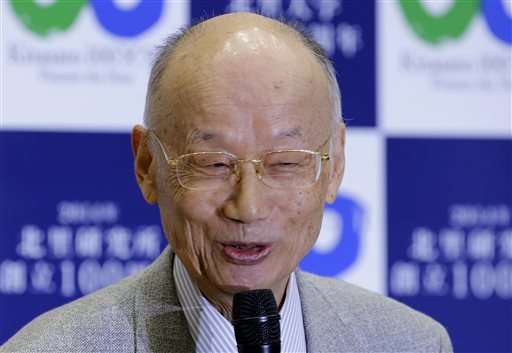
Still, artemisinin resistance has already been confirmed in Cambodia, Laos, Myanmar, Thailand and Vietnam.
There have been several previous Nobel Prizes for malaria research, including the 1902 award to British army surgeon Ronald Ross, who discovered that the disease is transmitted by mosquitos.
The last time a Chinese citizen won a Nobel was in 2012, when Mo Yan got the literature award. But China has been yearning for a Nobel Prize in science. This was the first Nobel Prize given to a Chinese scientist for work carried out within China.
"This is indeed a glorious moment," said Li Chenjian, a vice provost at prestigious Peking University. "This also is an acknowledgement to the traditional Chinese medicine, for the work began with herbal medicine."
Stephen Ward, deputy director of Liverpool School of Tropical Medicine, said the prize confirms that Chinese scientists "did fantastic work in the 1960s even when they were effectively ignored by the rest of the world."

The medicine award was the first Nobel Prize to be announced. The winners of the physics, chemistry and peace prizes are set to be announced later this week. The economics prize will be announced next Monday. No date has been set yet for the literature prize, but it is expected to be announced on Thursday.
Besides the cash prize, each winner also gets a diploma and a gold medal at the annual award ceremony on Dec. 10, the anniversary of the death of prize founder Alfred Nobel.
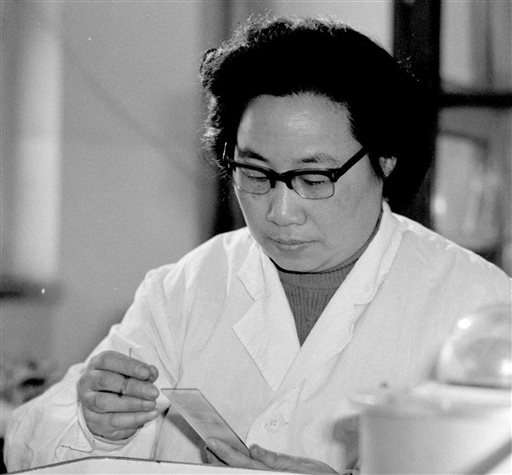
The Latest: Discovery on golf course inspired Nobel winner
Latest developments in the announcement of the Nobel Prize in Medicine (all times local):
___
2:45 p.m.
Nobel Prize-winner Satoshi Omura has revealed that the key to developing ivermectin was found on a golf course.
Omura and William Campbell on Monday were announced as winners of the Nobel Prize in medicine for developing the drug that has helped lower the incidence of river blindness and lymphatic filariasis, two diseases caused by parasitic worms.
Omura said the key substance was taken from a microbe contained in the soil sample at a golf course near Tokyo. He says he always carries a plastic bag in his wallet so he can collect soil sample any time.
Asked if he likes to play golf, he grinned, and said "yes."
___
2:25 p.m.
The jury selecting the winners for the Nobel Prize in medicine says the 2015 prize doesn't reward traditional medicine, but individuals inspired by such practices.
Prize committee chairwoman Juleen Zierath says she thinks traditional medicine can inspire scientists to develop new drugs.
Committee member Jan Anderson adds that the 2015 award is by no means the first prize given to laureates inspired by traditional medicine.
Anderson says the laureates were awarded for "the identification of the specific chemical compound within the traditional—that's the uniqueness."
___
2:00 p.m.
A Nobel committee member says the honor for Tu Youyou, the first Chinese national to win a Nobel Prize in medicine, is the fruit of fundamental changes in the way her country does science.
Committee member Jan Andersson says the award to Tu for discoveries concerning a novel therapy against malaria comes after the Chinese have "invested a lot in science" and "completely changed the way they structure how they do science."
He says that "now they become awarded for it and belong to the scientific community to a higher extent than they have done in the last 50 years."
___
1:45 p.m.
Disease experts say the drugs developed by Monday's Nobel laureates have had a major impact.
Ivermectin, developed from avermectin, "has spared millions of people from river blindness, which typically strikes people in their prime," said Colin Sutherland, reader in parasitology at London School of Hygiene and Tropical Medicine.
And "having artemisinin has been huge for malaria ... The whole world has changed its malaria policies to use artemisinin."
Stephen Ward, deputy director of Liverpool School of Tropical Medicine, called the new laureates "very worthy."
He also said that until artemisinin and combination therapies were available, "we faced an absolute catastrophe. The only drugs we had against malaria were failing rapidly."
___
12:55 p.m.
A member of the Nobel Prize committee says the work of the 2015 medicine laureates could help eliminate diseases affecting 3.4 billion people.
Jan Andersson says that as a result of the laureates' discoveries, the World Health Organization now has a plan aimed at eradicating river blindness in the 31 countries where the disease is endemic by 2025. He says the WHO also hopes to eradicate elephantiasis in 61 of the 81 countries affected by 2020.
He says that partly as a result of Tu Youyou's discovery, the mortality from malaria has been reduced by 50 percent in the last 10 years, and the number of infections has been cut by 40 percent. Andersson says the WHO now hopes to eliminate malaria in 35 countries by 2035.
___
12:45 p.m.
Satoshi Omura says he wonders whether he deserved to share in the Noble Prize in Medicine.
Omura and William Campbell were cited for discovering a drug that has helped lower the incidence of river blindness and lymphatic filariasis, two diseases caused by parasitic worms.
In a televised interview on Japan's national broadcaster NHK, Omura commented: "I have learned so much from microorganisms and I have depended on them, so I would much rather give the prize to microorganisms."
He added: "This is kind of a low-profile research area, but microorganisms are extremely important for humans. They can be our partners. I hope the area gets more attention because of the prize so that it can further contribute to human beings."
___
12:05 p.m.
Nobel Prize committee member Hans Forssberg says the discoveries of the 2015 Nobel Prize in medicine winners have fundamentally changed the treatments of hundreds of millions of the most vulnerable people in the world.
Forsberg says Tu Youyou's discovery has "markedly reduced the death toll during the last decade" from malaria, while discoveries by William Campbell and Satoshi Omura have contributed to dramatically reducing the number of individuals affected each year from "the stigmatizing and disabling symptoms" of river blindness and elphentiasis.
Forssberg says the discoveries represent a paradigm shift in medicine that also has a positive effect on society as a whole.
He says: "By allowing children to go to school and adults to go to work the treatment helps them to avoid poverty and contributes to an economic boost in society.
More information: www.nobelprize.org/nobel_prize … cine/laureates/2015/
© 2015 The Associated Press. All rights reserved.
















